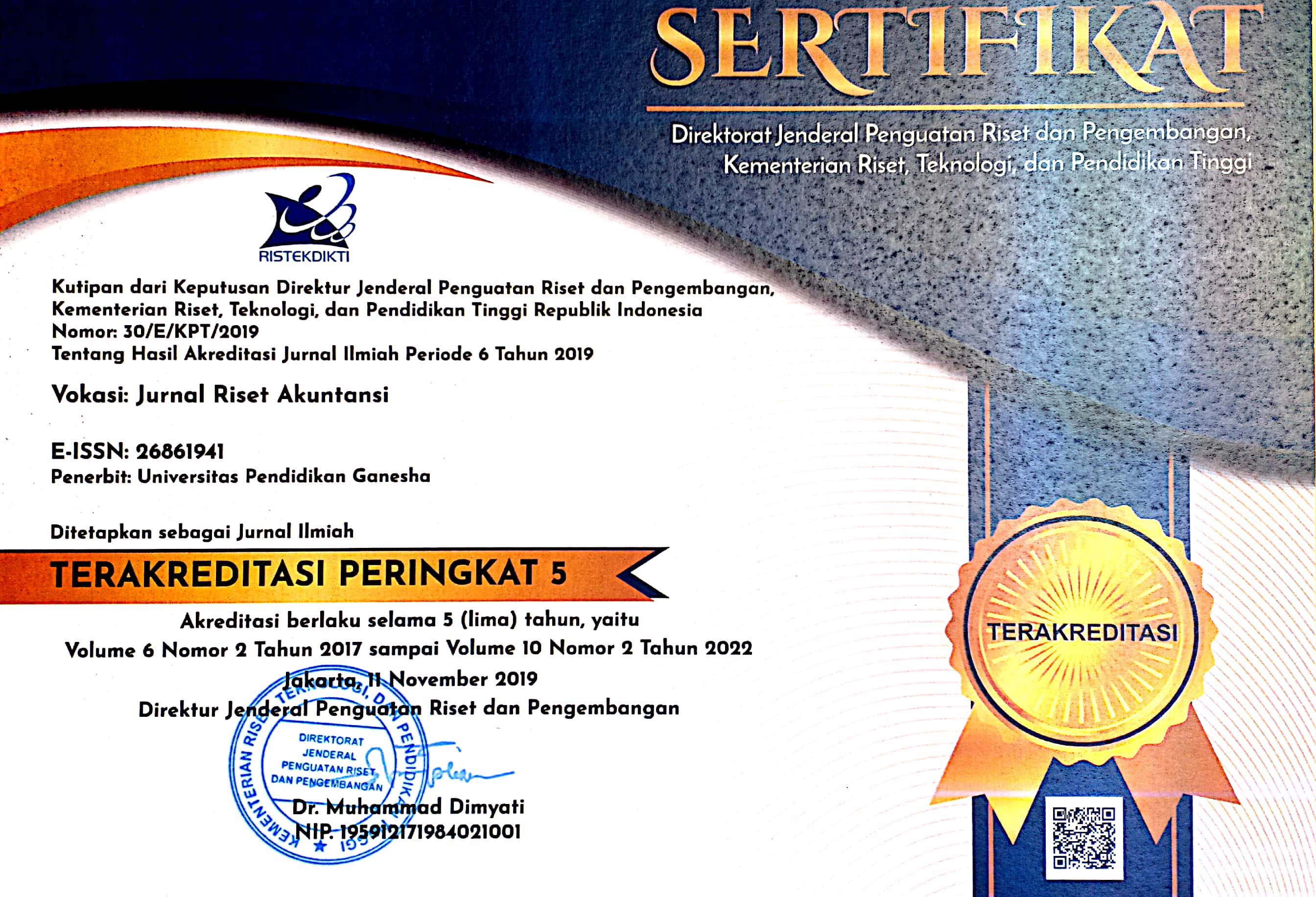Pengaruh Orientasi Etis, Gender, Dan Pengetahuan Kode Etik Akuntan Terhadap Persepsi Mahasiswa Akuntansi Mengenai Perilaku Tidak Etis Akuntan
DOI:
https://doi.org/10.23887/vjra.v9i2.26208Keywords:
Idealism, Relativism, Gender, Kowledge of Accountant Ethics, Student Perseption, Accountant Unethical BehaviorAbstract
This study aims to determine the effect of Idealism, Relativism, Gender, and Knowlegde of Ethic Accounting Code of Accounting Students’ Perseption on Unethical Accounting Behavior. This study used quantitative approach with primary data obtained from questionnaires and measured using a Likert Scale. The population of this study were accounting students at five universities in Bali in total 1,115 people. The sampling technique used convenience sampling with a sample criteria of accounting students who had been interned or worked at a Public Accounting Firm or at an Accountant Services Office, and accounting student who had taken courses in the Accounting Professional Education program. Determination of the minimum number of samples used the Isaac and Michael tables with a significance level of 5%, obtained a total sample of 265 people. Data analysis technicque used multiple linear regression analysis by using SPSS 22.0 for Windows. The result showed that idealism and knowledge of ethic accountant code had a negative influence on accounting student’ perseptions of accountant’s unethical behavior, while relativism had positive influence on accounting students’perseptions of accountant’s unethical behavior and male accounting students’ perception was proven more support unethical accountant’s behavior rather than female accounting students.
References
Afriani, Reti and Darman, Usman. 2017. Pengaruh Orientasi Etis, Pengetahuan Etika dan Locus Of Control Terhadap Persepsi Mahasiswa Akuntansi Atas Perilaku Tidak Etis Akuntan. Undergraduated thesis, Universitas Bengkulu.
Arifin, Zaenal Nur . 2019. Konferensi IAI 2019 di Bali Bahas Profesi Akuntan Harus Beradaptasi Seiring Perkembangan Teknologi.
Damayanthi, Putu Dewi Adi., Gede Juliarsa. 2016. Pengaruh Idealisme, Relativisme, Pengetahuan, Gender Dan Umur Pada Perilaku Tidak Etis Akuntan.
Ghozali, Imam. 2006. Aplikasi Analisis Multivariate dengan Program SPSS. Semarang : Badan Penerbit UNDIP.
Ghozali, Imam. 2018. Aplikasi Analisis Multivariate Dengan Program SPSS. Semarang: Badan Penerbit Universitas Diponegoro.
Ikatan Akuntan Indonesia. 2011. Standar Profesional Akuntan Publik. Jakarta: Salemba Empat.
Mardawati, Revita. Mimin Nur Aisyah. 2014. Pengaruh Orientasi Etis, Gender, Dan Pengetahuan Etika Profesi Terhadap Persepsi Mahasiswa Akuntansi Atas Perilaku Tidak Etis Akuntan.
Novayanti, E. 2017. Pengaruh Orientasi Etis dan Tingkat Pengetahuan Mahasiswa Terhadap Persepsi Mahasiswa Mengenai Perilaku Tidak Etis Akuntansi. Skripsi. Universitas Mahasaraswati.
Nurcahyo, Immanuel Oky., Ahmar, Nurmala. 2012. Idealisme, Relativisme, Dan Kreativitas Akuntan. The Indonesian Accounting Review Volume 2, No. 1, January 2012, pages 73 – 90.
Nurlan, Andi Besse. 2011. Skripsi : Persepsi Akuntan dan Mahasiswa Jurusan Akuntansi terhadap Kode Etik Ikatan Akuntan Indonesia. Universitas Hasanuddin Makassar.
Rahayu, Septi. 2017. Pengaruh Gender, Pengetahuan Etika Profesi Akuntan, dan Jenis Perguruan Tinggi terhadap Persepsi Mahasiswa Akuntansi Mengenai Creative Accounting. Skripsi : Universitas Negeri Yogyakarta.
Sankaran, S and Bui, T. 2003. “Ethical Attitudes Among Accounting Majors : An Empirical Study”. Journal of the American Academy of Business. Vol 3 No 1, pp 71-77.
Sukrisno, Agoes., dan I Cenik Ardana. 2011. Etika Bisnis dan Profesi Tantangan Membangun Manusia Seutuhnya (Edisi Revisi). Jakarta : Salemba Empat.
Sumiyantini, Ni Kadek., Ni Kadek Sinarwati, dan Anantawikrama TunggaAtmadja. 2017. Persepsi Mahasiswa Jurusan Akuntansi Mengenai Idealisme, Relativisme Dan Tingkat Pengetahuan Pada Perilaku Tidak Etis Akuntan (Studi pada Mahasiswa Jurusan Akuntansi Universitas Pendidikan Ganesha).
Yuliani, Kadek Sumi. 2019. Pengaruh Orientasi Etika, Tingkat Pengetahuan Dan Gender Terhadap Persepsi Mahasiswa Mengenai Perilaku Tidak Etis Akuntan.









